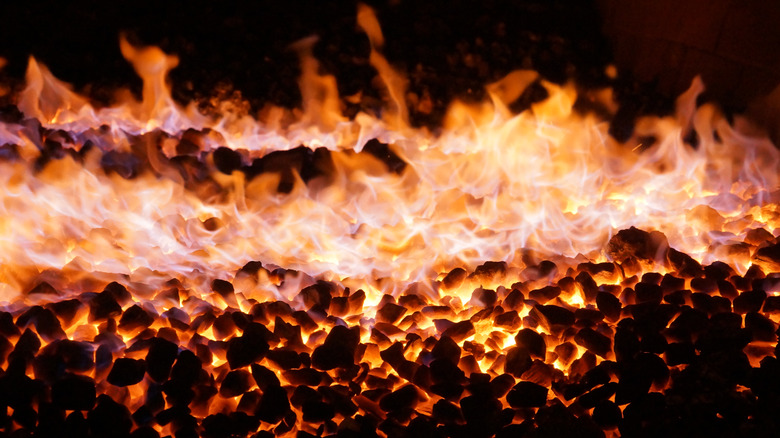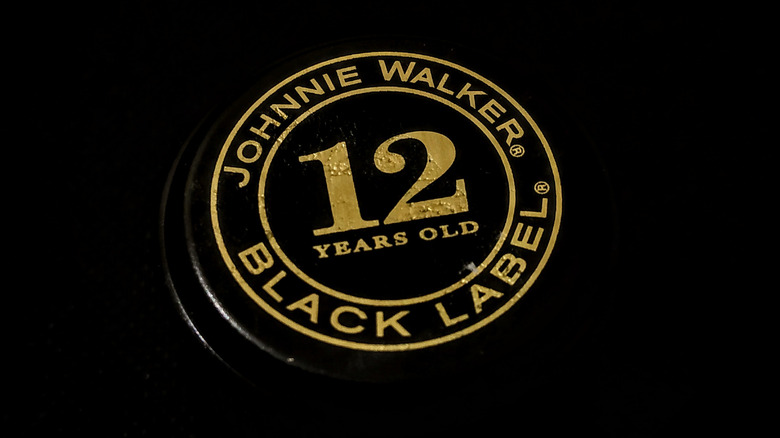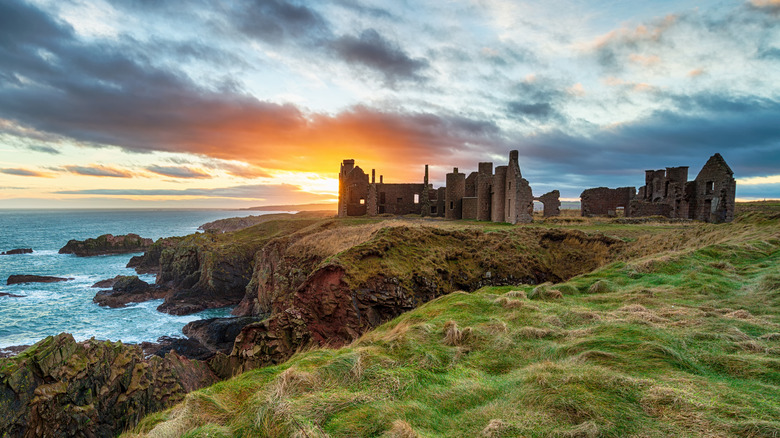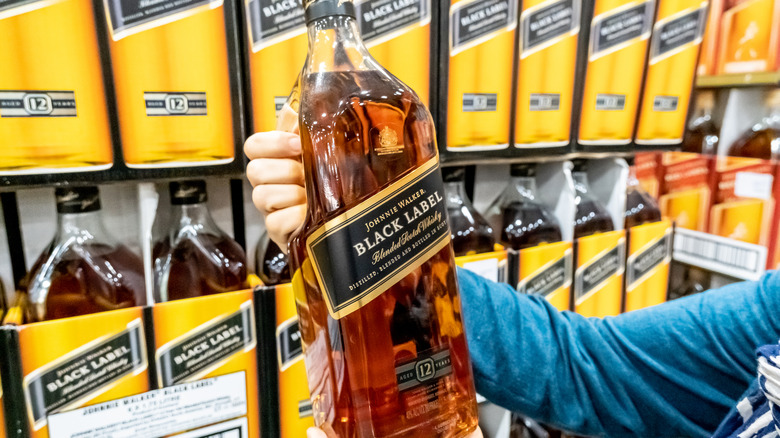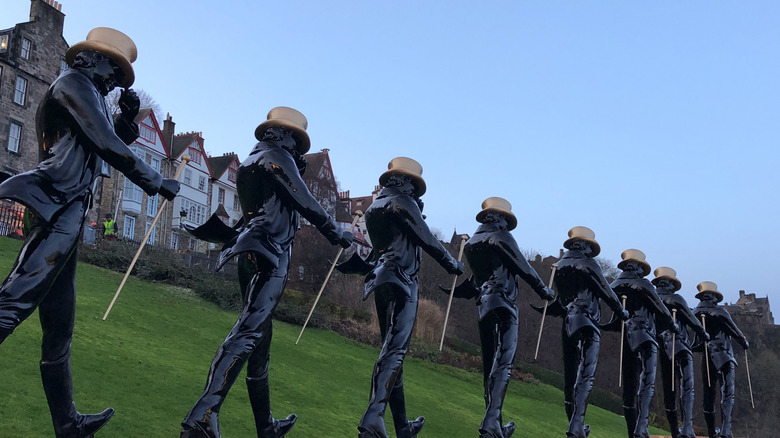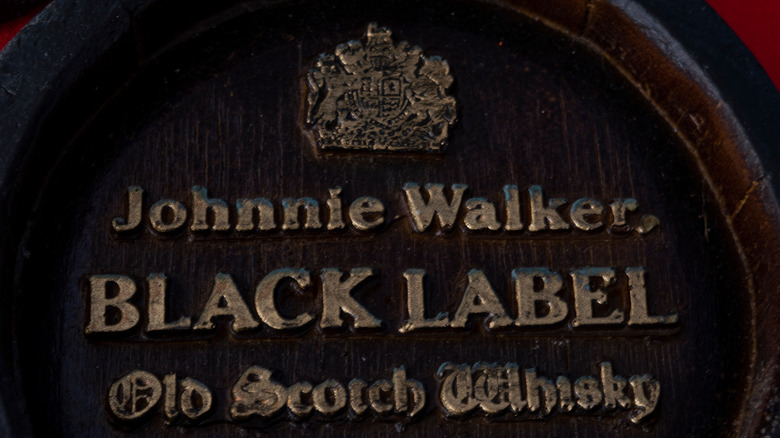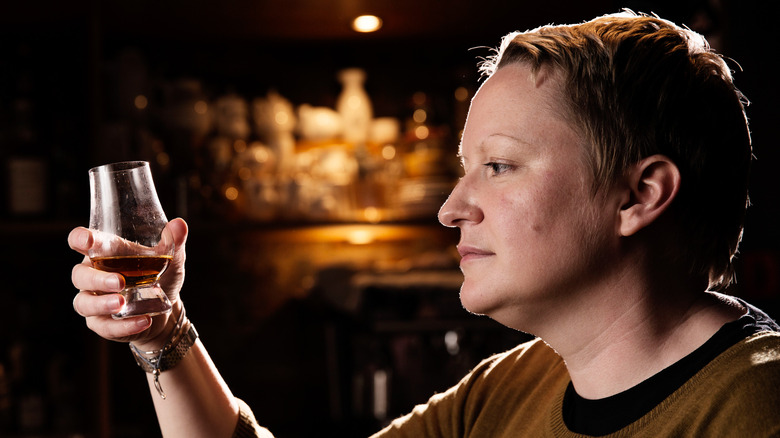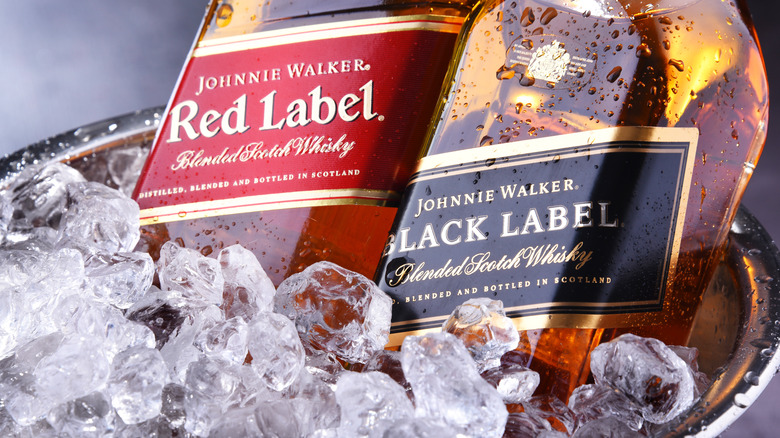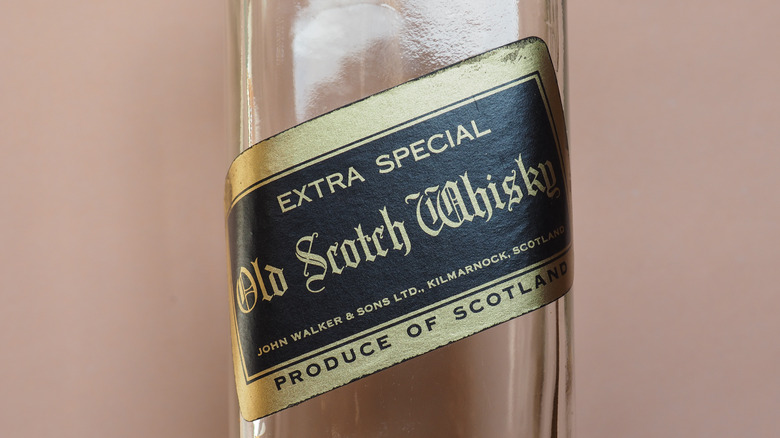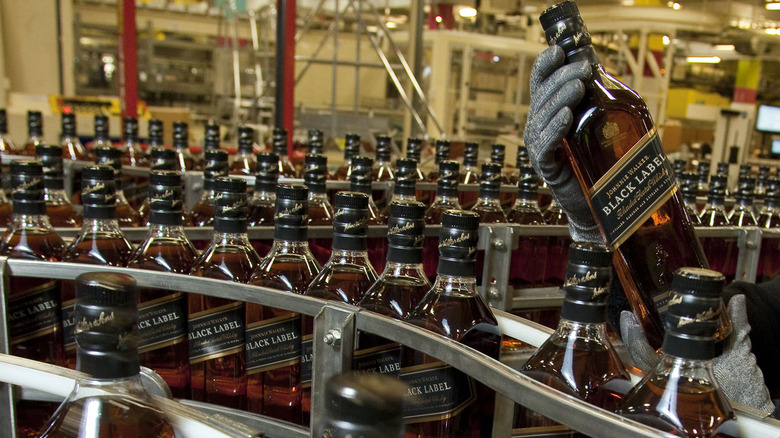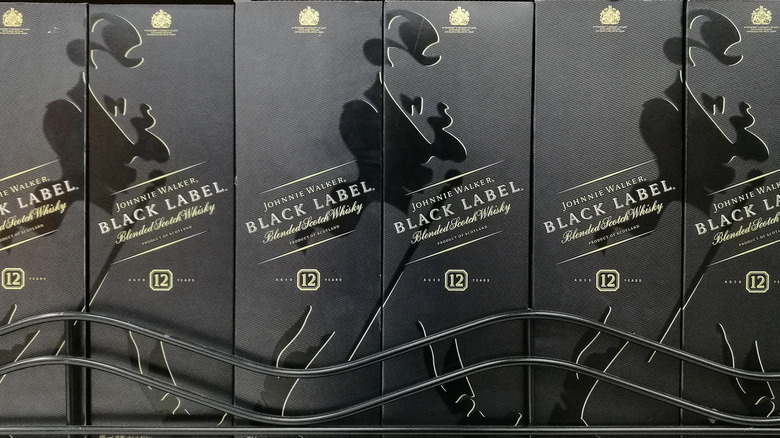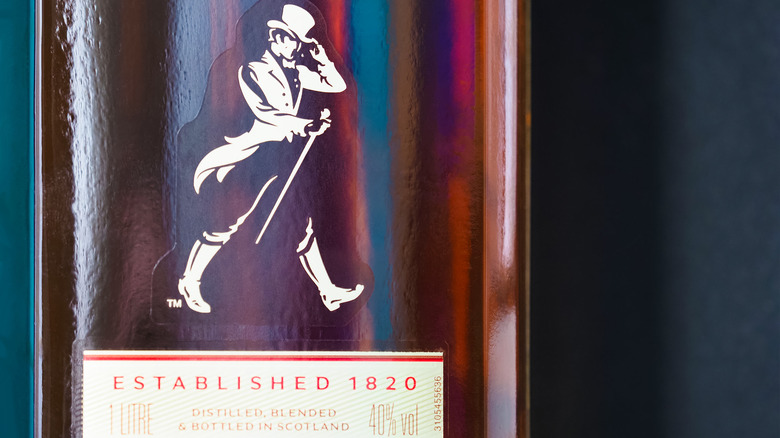Johnnie Walker Black Label: Everything You Need To Know
A classic is a classic for a reason. The Whopper. Hershey's Milk Chocolate Bar. Sam Adams Boston Lager. It's impossible to deny the beloved nature of such iconic products, or to overstate their societal impact. Those truly classic creations that touch a cultural nerve, allowing them to stand the test of time, aren't simply a result of dumb luck and happenstance. After all, you can't reach the top of the mountain without being legitimately good at what you're doing.
The classics can be comforting on those occasions you want to skip the fuss, and just order a drink you know will deliver. So when you want a glass of Scotch whisky, but are overwhelmed by the seemingly-limitless number of available options? Stick to what works, and grab yourself a glass of Johnnie Walker Black Label.
No whisky may better embody the essence of Scotch like Johnnie Walker Black Label. This tried-and-true liquor has been satisfying Scotch lovers for nearly two centuries, with a sweet, smoky, and spicy flavor profile. There's never a doubt about what you'll be getting when you buy or order Black Label blended whisky — or whether you'll walk away with a satisfied smile (and keep walking). If you've ever been curious about this monumentally popular Scotch, look no further, as we explore everything you need to know about the one and only Johnnie Walker Black Label.
It's a peated whisky
Known for the distinctive smoky flavor found in every sip, Johnnie Walker Black Label is what's classified as a peated whisky, per Liquor.com. But that subtle-yet-undeniable smokiness isn't something that can be achieved through the perfunctory use of a smoking gun. Rather, it's the direct result of the drying process, or the second of five steps involved in making whisky: malting, drying, fermentation, distilling, and maturing.
Since the malting stage involves soaking cereal in water to induce germination, the drying stage involves, well, you guessed it: drying the barley or grain in a kiln. Historically, peat — a type of fuel made up of decaying organic matter — was used to power a kiln when making Scotch, as it was one of the main heating sources in Scotland for centuries, according to World Whisky Day.
Compared to other sources of smoke, peat produces an overwhelming and far smokier-tasting flavor when infused into the cereal. This may be why Johnnie Walker Black Label isn't dried exclusively with peat, and why the Scotch, while undoubtedly a peated variety, has a more low-key smoky taste than other available options — like the Double Black version produced by the company.
It's aged for a minimum of 12 years
One of the most well-known aspects of Johnnie Walker Black Label is its bottle design, which includes the proud declaration of being aged 12 years. The enormous, centrally-placed 12 on top of the bottle cap — in bright gold, over a stark black background — leaves no doubt as to how long the Scotch has been barrel-aged. It's a guarantee designed to comfort consumers, assuring them that their choice of whisky is no younger than a tween.
Of course, as a blended whisky, Johnnie Walker Black Label can't guarantee it's made up of exclusively 12-year aged varieties. But while the very nature of blended whiskies makes it challenging to pinpoint a bottle's exact age, fans of this classic Scotch can take solace, as the 12-year proclamation only refers to the youngest whisky in a blend, per Whisky Advocate.
This means Johnnie Walker Black Label must be aged for, at the minimum, 12 years. In other words, there's no reason to doubt the product's proclamation, and you can be confident in believing the bottle's age statement. Either way, the age is far beyond three years, or the minimum aging requirement for a whisky to be considered Scotch, per Scotch Whisky Association.
It's a blend of whiskies from all over Scotland
There are countless varieties and variations of whiskey around the world, but there's only one place where you can make Scotch: Scotland. This may not be very surprising, given the name and all, but that location caveat is just one of several strictly-regulated requirements that must be followed in order for a whisky to qualify as Scotch, per the Scotch Whisky Association.
Luckily for fans of Johnnie Walker Black Label, the company more than meets those expectations, as the delightfully smooth whisky isn't just produced in Scotland — according to Liquor.com, it's made up of more than 40 whiskies made around the country.
"Our founder John Walker sought the finest whiskies from the four corners of Scotland to craft something really special for his customers, and we continue this today by drawing from the largest selection of maturing Scotch stocks in the world," master blender Emma Walker told Forbes. The key to the blended variety's consistency, she explained, comes from knowing the ins and outs of the individual whiskies that make up the end product.
It's one of the most popular whiskies in the world
There's no denying the widespread popularity and name brand recognition of Johnnie Walker Black Label. But Johnnie Walker isn't just seemingly synonymous with the word Scotch. It's also the best-selling whisky brand in the entire world as of 2021 — and has been for a while, per The Spirits Business. Not only has Johnnie Walker dominated the whisky landscape for more than a century, but it may as well be doing laps around its competitors.
Frankly, nothing may better demonstrate just how popular the whisky brand is throughout the world than its plummeting sales from 2020. As The Spirits Business reported, despite a massive 23.3% decrease in overall sales, the brand remained the top-selling whisky producer. But Johnnie Walker didn't simply remain atop the whisky world: it still somehow managed to more than double the production of the second place finisher.
Whether it's a product of its unparalleled quality, or the relentlessly aggressive advertising and expansion campaigns undertaken by the company, there's no denying that Johnnie Walker — along with its signature Black Label variety — is the most popular whisky in the world.
It's one of Johnnie Walker's signature products
Described by the company itself as "one of life's true icons," it's difficult to argue with this slightly braggadocious declaration about Johnnie Walker Black Label. After all, it's not exactly an inaccurate statement. As one of Alexander Walker's original blends, along with Red Label, the Black Label variety has earned its signature status within the company. And when you consider its widespread availability, and monumental popularity around the globe, it certainly fits the label of a "true icon."
Walk into any bar, liquor store, or restaurant, in any location in the world, and you're almost guaranteed to find Johnnie Walker Black Label for sale. It's such a well-known variety of blended whisky, in fact, that a more seasoned Scotch drinker may find it too reliably consistent — to the point that some may even find it underwhelming, according to Liquor.com.
But the presence of detractors may just be the price to pay for legendary status. Because love it or hate it, there's no arguing with the facts surrounding Johnnie Walker Black Label's status within the company, or around the world.
Its legacy stretches back to the early 19th century
It may seem fairly easy to ascertain how long Johnnie Walker Black Label has been produced, given the company's famous tagline of "Born in 1820 — still going strong." Though this date is somewhat of a misnomer, in regards to the production of the brand's famous whisky varieties, its legacy does begin way back in the early 19th century — when the brand's namesake, John Walker, opened a grocery store in Kilmarnock, Scotland.
Soon after opening his store (at the ripe young age of 15, according to The Spirits Business, Walker added whisky to his inventory. But finding the single-malts of the day lacking, he decided to tinker with his available options, and began blending the whiskies to create a superior product. Success soon followed the store's opening, and as the store grew in stature, so did the popularity of Walker's blended whisky among locals.
After Walker's death in 1857, his son, Alexander, took over the grocery store. With the Industrial Revolution in full swing, Alexander took advantage, and created the first true Johnnie Walker blend, under the original name, Walker's Old Highland. This new whisky — the precursor for what would eventually become both Black Label and Red Label — was soon packaged for sale outside the Kilmarnock store, and, eventually, exported around the world.
Their current master blender made history
As noted in The New York Times, whiskey-making has largely been a boys' club throughout history, with a limited number of women found in essential roles in the whiskey industry. While Johnnie Walker has historically led the charge on all things whiskey-related, it, too, has been on the wrong side of this unfortunate trend for much of its existence.
But recent events have signaled a sea change within the male-dominated industry, and, in January 2022, Johnnie Walker followed suit. Per Food&Wine, the company appointed Emma Walker (no relation to the founder) as the master blender for the brand – the first women to take on that role in its long and illustrious history. Armed with a PhD and background in chemistry, Walker has been working for the company since 2008, and understood the significance of her ascension, into the position, for women around the world. "If you see someone like yourself doing a job, it's easier to picture yourself in a similar role," she told Forbes in November 2021.
Not that she was surprised the company was willing to buck tradition by making her its first female master blender. After all, as she said in Forbes, "Innovation is part of what we do, what we have always done, it's in our DNA."
It isn't the best-selling Johnnie Walker product
There's clearly no denying the stature of Johnnie Walker Black Label. As the signature product of the best-selling whisky brand on the market, you may be inclined to believe this iconic blended whisky is head-and-shoulders above the competition. And while the Johnnie Walker brand is indeed the world's most popular whisky, the Black Label variety isn't the highest-seller under its umbrella.
No, that distinction belongs to Johnnie Walker Red Label — the close sibling of Black Label, which has been in existence just as long. Perhaps boosted by its borderline spicy flavor profile, and more pronounced smokiness, Johnnie Walker Red Label has long been the number-one selling Scotch whisky, according to Forbes.
It's certainly possible that the different flavor notes found in Red Label versus Black Label is the driving factor in the former's better sales numbers. But, more realistically, there's a far simpler explanation: Red Label is much cheaper than Black Label, with a 750 ml bottle of Red Label costing $12 less than a Black Label bottle in 2022.
It wasn't originally called Johnnie Walker Black Label
It's not uncommon for brands to undergo name changes over the course of their history, particularly those that have existed for decades or centuries. Usually, these former names become little more than a fun fact, as they're overshadowed by their more-famous label — like how Pepsi was originally called Brad's Drink, after its inventor, Caleb Bradham, per the NC Department of Natural and Cultural Resources.
Being "born in 1820," Johnnie Walker whisky, and its signature Black Label variety, is no stranger to this common practice of renaming. And before Alexander Walker's two sons renamed the original whisky blends Black Label and Red Label, after the actual color of their labels — clearly their concern was with making whisky, not naming it — the blend we now know as Johnnie Walker Black Label was known as Walker's Old Highland, according to The Spirits Business.
Walker's Old Highland isn't the only former name for Johnnie Walker Black Label, though the exact timeline and circumstance for each rebranding isn't entirely clear. At different times during its storied history, Black Label has been called Extra Special Old Highland, as well as Extra Special Old Scotch. But the simplicity of Johnnie Walker Black Label was what stuck, and, by 1920, the whisky was available in 120 countries under that name.
Its crooked label is designed to draw attention
Have you ever noticed the ever-so-slight tilt of the Johnnie Walker label? It may look like the unfortunate result of a plant worker who'd gotten into the Scotch a bit too early, but the distinctively crooked angle of its label isn't by accident — it's entirely by design.
An idea from Alexander Walker, the crooked label was initially conceived as a cheap way of standing out from the crowd on store shelves. Since most whisky bottles blended together (no pun intended) with the others, Alexander went with another approach. As the Johnnie Walker website recounts, "He also added the distinctive label, slanted at precisely 20 degrees, to make it stand out even further from the crowd." This rationale still drives the labeling style to this day, because it works. After all, there's no mistaking that instantly-recognizable design from a distance, and there's no chance you'll have trouble finding a bottle of Johnnie Walker Black Label amongst a sea of Scotch whiskies.
The slanted label isn't the only unique component of the Johnnie Walker bottle, nor was it the only change spurred by Alexander. In addition to the crooked label, the brand's square-shaped bottle — which was decided as a way to prevent shattering — ensures no one will ever mistake Johnnie Walker for any other liquor.
It's a great Scotch for first-timers
There's something genuinely appealing about the simple sophistication exuded by a Scotch drinker. If you're eager to join that classy club, with or without a cigar in hand, and increase your personal intake of whisky and/or Scotch, Liquor.com maintains you're unlikely to find a better initial foray than Johnnie Walker Black Label.
For folks unsure where to start their journey towards Scotch whisky fandom, you can't beat the hints of sweetness, complemented by a subtle smokiness, found in Johnnie Walker Black Label. The incomparably smooth whisky flourishes with flavor in a delicate manner, easing the transition for those who aren't sure whether their palate can handle Scotch.
And if you'd like to incorporate Scotch whisky into your rotation of cocktails, but are turned off by the idea of drinking alcohol straight — neat or on the rocks — Johnnie Walker Black Label makes a lovely base for a wide variety of mixed drinks. The company suggests a number of highball cocktail options on its website, with either lemonade or ginger ale making a perfect mixer for Black Label whisky.
It wasn't first made in 1820 despite what the label says
There's no debate surrounding what year John Walker first opened his humble grocery store as a teenager in Kilmarnock. And while the company's been established since 1820, it has not been making its signature Black Label variety since 1820.
Now, it's not exactly earth-shattering news to discover a famous company has taken some liberties in its advertising philosophy. And it is true that John Walker did, indeed, produce a popular blended whisky product at his grocery store, laying the path for his son, Alexander, to eventually create the iconic Black Label variety.
But the famous whisky we all know and love wasn't truly created until 1857, when the first steps were taken by Alexander towards a consistent, mass production of his blended varieties. Per The Spirits Business, the whisky wouldn't be branded by its now-iconic colored name for another half-century, when the grandsons of the company's namesake, George and Alexander II, rebranded their signature product to its current name, of Johnnie Walker Black Label, in 1909.

